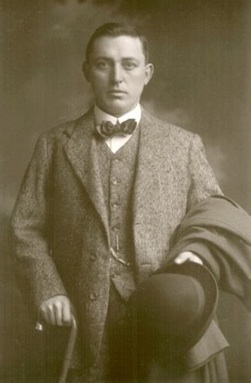Mark Sheridan, born Frederick Shaw (1865/6 – 15 January 1918), was an English music-hall comedian and singer. He recorded more than fifty songs during his career, the most successful of which were “Here We Are! Here We Are! Here We Are Again!!!” (1914) written by Charles Knight and Kenneth Lyle, and described as the battle cry of the British army; “Who Were You with Last Night?” (1912) written by Sheridan and Fred Godfrey; and “I Do Like To Be Beside the Seaside” (1909), written by John A. Glover-Kind.[1]
Sheridan’s music-hall career declined in later years, and he turned his attention to revue. In 1917 he wrote and composed the musical burlesque, Gay Paree, but it was not universally well-received. During its opening performance at the Coliseum in Glasgow in early 1918 it was met with some whistling and booing from the audience; the following afternoon Sheridan’s body was found in Kelvingrove Park in Glasgow, shot through the head, assumed to be suicide.[2][3]
Early life and career
Sheridan was born in Hendon, Tyne and Wear in 1865/6, and began working with his father, a sail maker, on Sunderland docks. He progressed from there to working in the back offices of the Newcastle-upon-Tyne Theatre for four years between 1877 and 1881.[4] After moving from amateur dramatics to the professional theatre, he decided to adopt the stage name of Mark Sheridan, taken from the first name of the American writer and humorist Mark Twain and his Irish mother’s maiden surname of Sheridan.[5] He honed his act not only in Britain but also in South Africa and Australia, and by 1914 he had become a “roaring success” in his trademark top hat and tails, popular in music halls across Britain.[2]
YouTube
Later career and death
In 1915 Sheridan starred in the comic revue Winkles,[6] which later toured the northern provinces,[7] and as music hall was on the decline, Sheridan decided to concentrate on revue. But during his later years he believed that his popularity was waning, and he was plagued by deep insecurities and depression.[2]
In 1917 Sheridan returned to Glasgow, where he had enjoyed some of his earliest successes. He had written and personally financed Gay Paree, a musical burlesque show based on the W. G. Wills West End favourite, A Royal Divorce.[2] It cost Sheridan £2,000, and had a London company of forty people, including two of his children, Billy and Fred.[2] On 14 January 1918 Gay Paree opened at the Coliseum in Glasgow, with Sheridan playing the part of Napoleon. The production received negative reviews from audiences and newspaper critics, and Sheridan’s own performance was criticised,[2] which apparently resulted in his suicide the following day.[8]
Ironically, Gay Paree was not the flop Sheridan had perhaps feared it to be, as it continued for five months under the direction of his widow,[2] Ethel Maude Davenport, whom he had married in Wandsworth, south London on 16 March 1889.[9]



